人教版(2019)必修 第三册Unit 5 The Value of Money单元复习学案(含答案)
文档属性
| 名称 | 人教版(2019)必修 第三册Unit 5 The Value of Money单元复习学案(含答案) | 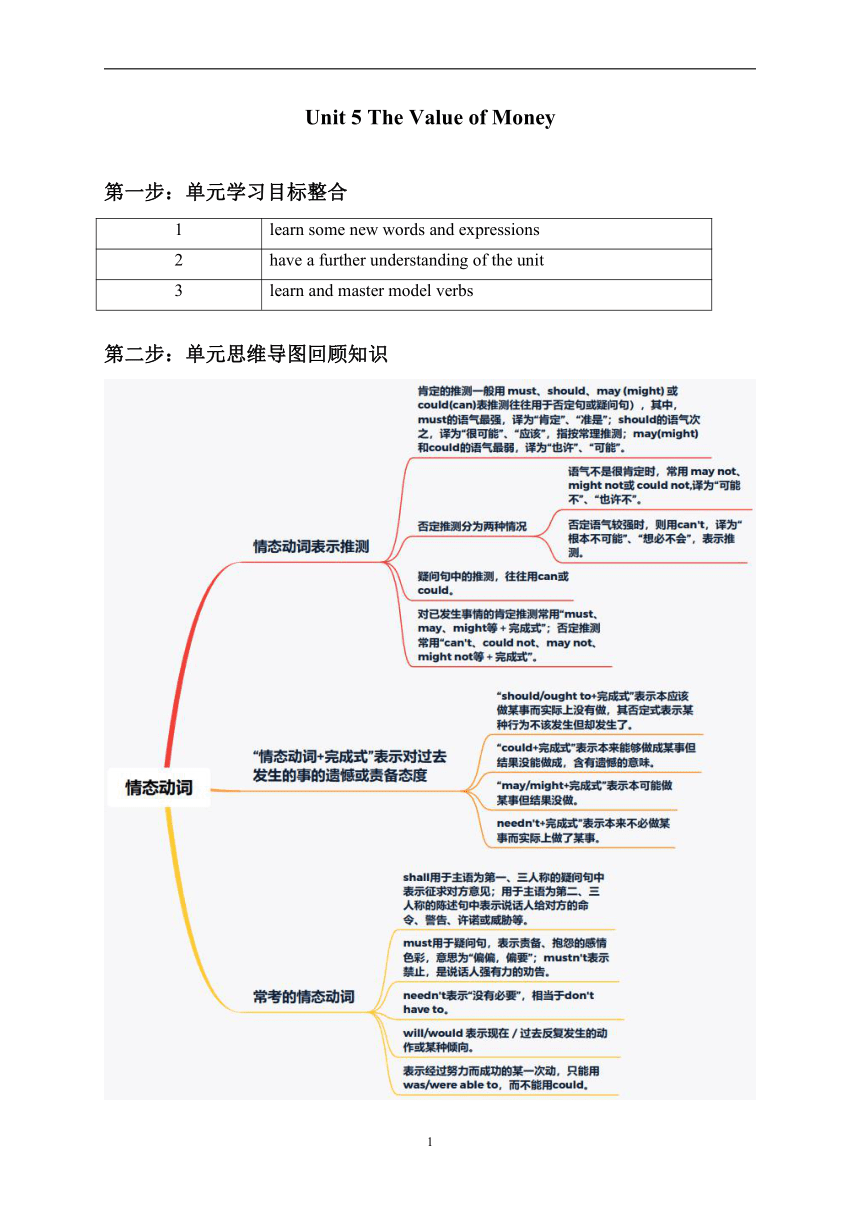 | |
| 格式 | docx | ||
| 文件大小 | 288.8KB | ||
| 资源类型 | 教案 | ||
| 版本资源 | 人教版(2019) | ||
| 科目 | 英语 | ||
| 更新时间 | 2023-05-25 10:33:39 | ||
图片预览

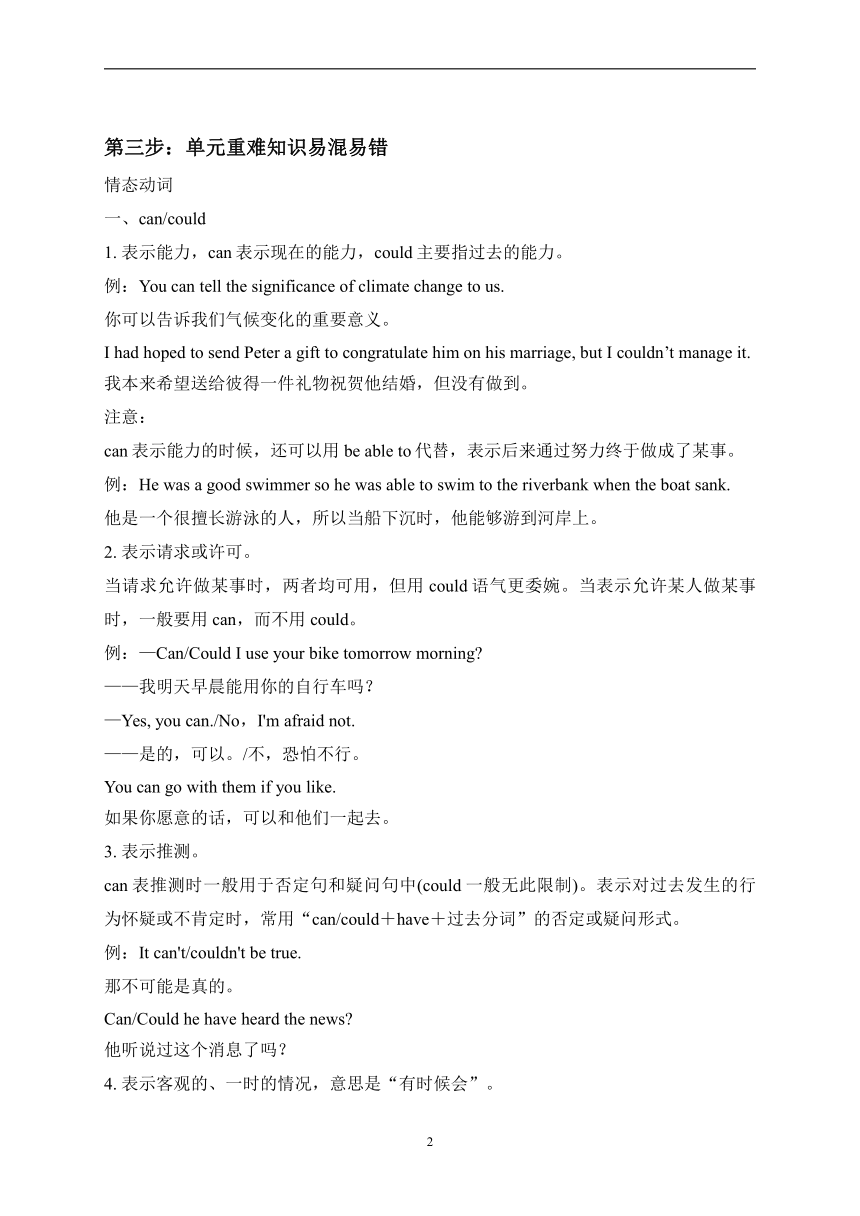
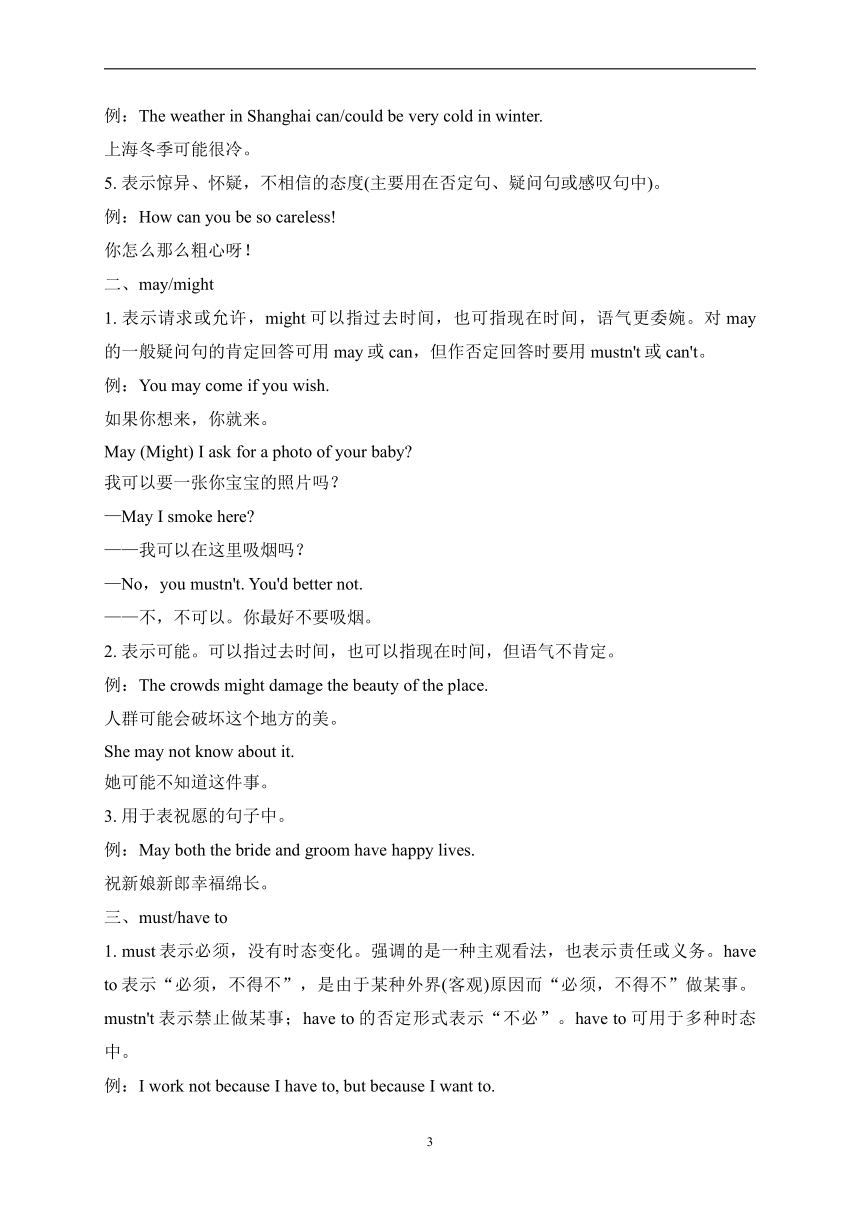
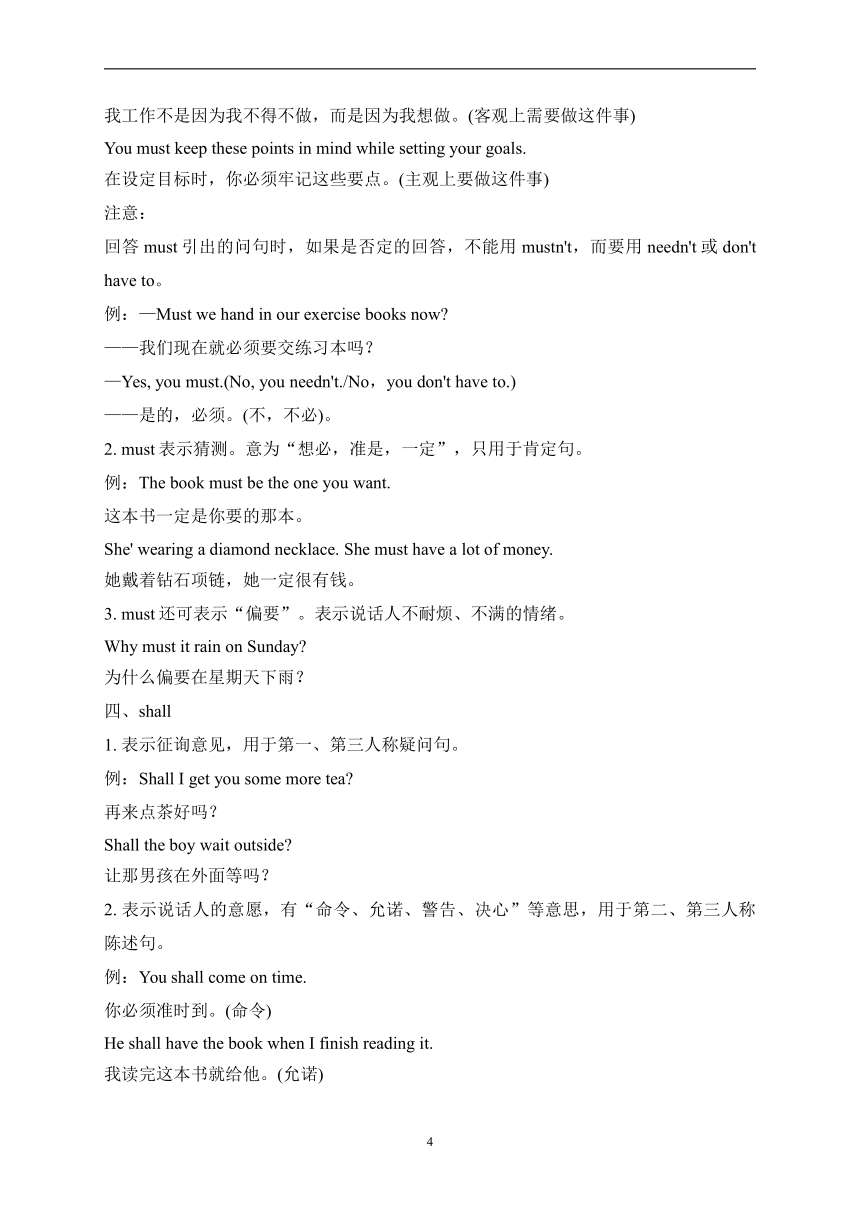
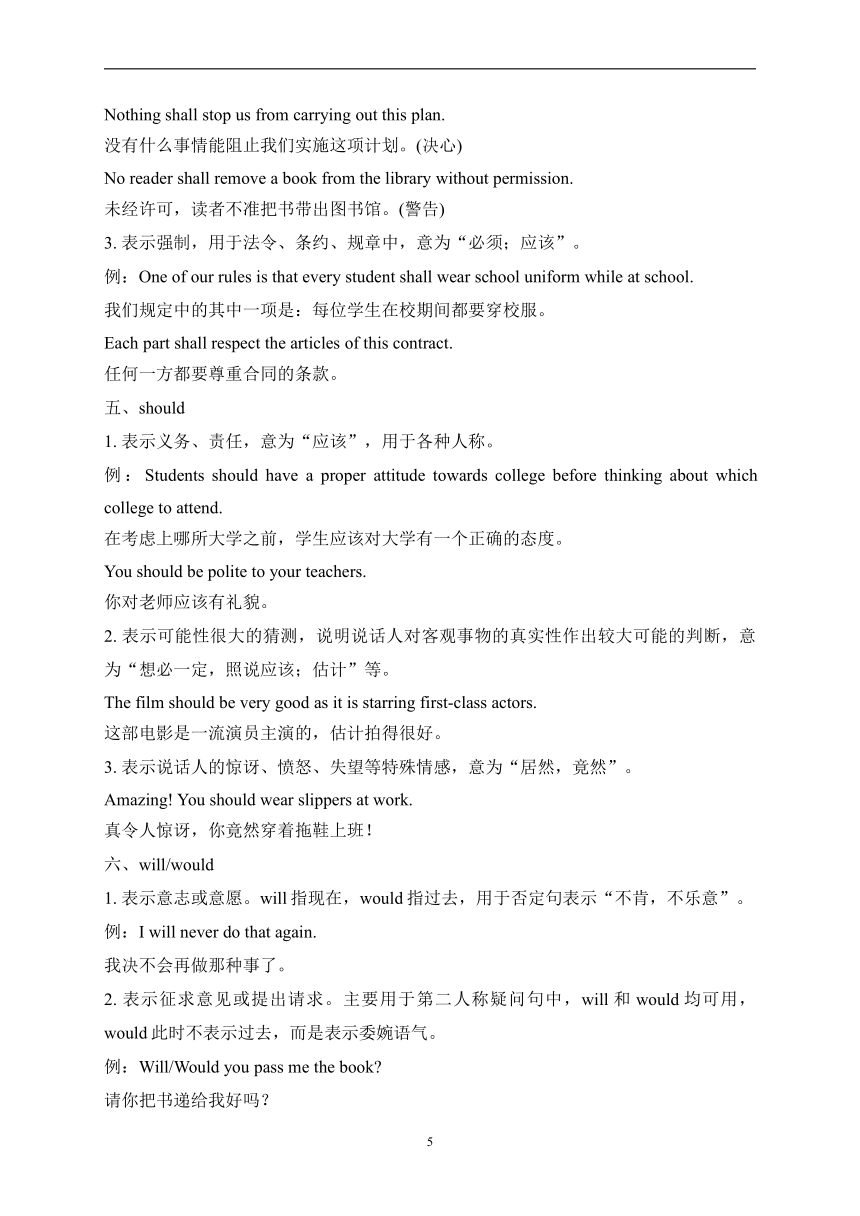
文档简介
Unit 5 The Value of Money
第一步:单元学习目标整合
1 learn some new words and expressions
2 have a further understanding of the unit
3 learn and master model verbs
第二步:单元思维导图回顾知识
第三步:单元重难知识易混易错
情态动词
一、can/could
1. 表示能力,can表示现在的能力,could主要指过去的能力。
例:You can tell the significance of climate change to us.
你可以告诉我们气候变化的重要意义。
I had hoped to send Peter a gift to congratulate him on his marriage, but I couldn’t manage it.
我本来希望送给彼得一件礼物祝贺他结婚,但没有做到。
注意:
can表示能力的时候,还可以用be able to代替,表示后来通过努力终于做成了某事。
例:He was a good swimmer so he was able to swim to the riverbank when the boat sank.
他是一个很擅长游泳的人,所以当船下沉时,他能够游到河岸上。
2. 表示请求或许可。
当请求允许做某事时,两者均可用,但用could语气更委婉。当表示允许某人做某事时,一般要用can,而不用could。
例:—Can/Could I use your bike tomorrow morning
——我明天早晨能用你的自行车吗?
—Yes, you can./No,I'm afraid not.
——是的,可以。/不,恐怕不行。
You can go with them if you like.
如果你愿意的话,可以和他们一起去。
3. 表示推测。
can表推测时一般用于否定句和疑问句中(could一般无此限制)。表示对过去发生的行为怀疑或不肯定时,常用“can/could+have+过去分词”的否定或疑问形式。
例:It can't/couldn't be true.
那不可能是真的。
Can/Could he have heard the news
他听说过这个消息了吗?
4. 表示客观的、一时的情况,意思是“有时候会”。
例:The weather in Shanghai can/could be very cold in winter.
上海冬季可能很冷。
5. 表示惊异、怀疑,不相信的态度(主要用在否定句、疑问句或感叹句中)。
例:How can you be so careless!
你怎么那么粗心呀!
二、may/might
1. 表示请求或允许,might可以指过去时间,也可指现在时间,语气更委婉。对may的一般疑问句的肯定回答可用may或can,但作否定回答时要用mustn't或can't。
例:You may come if you wish.
如果你想来,你就来。
May (Might) I ask for a photo of your baby
我可以要一张你宝宝的照片吗?
—May I smoke here
——我可以在这里吸烟吗?
—No,you mustn't. You'd better not.
——不,不可以。你最好不要吸烟。
2. 表示可能。可以指过去时间,也可以指现在时间,但语气不肯定。
例:The crowds might damage the beauty of the place.
人群可能会破坏这个地方的美。
She may not know about it.
她可能不知道这件事。
3. 用于表祝愿的句子中。
例:May both the bride and groom have happy lives.
祝新娘新郎幸福绵长。
三、must/have to
1. must表示必须,没有时态变化。强调的是一种主观看法,也表示责任或义务。have to表示“必须,不得不”,是由于某种外界(客观)原因而“必须,不得不”做某事。mustn't表示禁止做某事;have to的否定形式表示“不必”。have to可用于多种时态中。
例:I work not because I have to, but because I want to.
我工作不是因为我不得不做,而是因为我想做。(客观上需要做这件事)
You must keep these points in mind while setting your goals.
在设定目标时,你必须牢记这些要点。(主观上要做这件事)
注意:
回答must引出的问句时,如果是否定的回答,不能用mustn't,而要用needn't或don't have to。
例:—Must we hand in our exercise books now
——我们现在就必须要交练习本吗?
—Yes, you must.(No, you needn't./No,you don't have to.)
——是的,必须。(不,不必)。
2. must表示猜测。意为“想必,准是,一定”,只用于肯定句。
例:The book must be the one you want.
这本书一定是你要的那本。
She' wearing a diamond necklace. She must have a lot of money.
她戴着钻石项链,她一定很有钱。
3. must还可表示“偏要”。表示说话人不耐烦、不满的情绪。
Why must it rain on Sunday
为什么偏要在星期天下雨?
四、shall
1. 表示征询意见,用于第一、第三人称疑问句。
例:Shall I get you some more tea
再来点茶好吗?
Shall the boy wait outside
让那男孩在外面等吗?
2. 表示说话人的意愿,有“命令、允诺、警告、决心”等意思,用于第二、第三人称陈述句。
例:You shall come on time.
你必须准时到。(命令)
He shall have the book when I finish reading it.
我读完这本书就给他。(允诺)
Nothing shall stop us from carrying out this plan.
没有什么事情能阻止我们实施这项计划。(决心)
No reader shall remove a book from the library without permission.
未经许可,读者不准把书带出图书馆。(警告)
3. 表示强制,用于法令、条约、规章中,意为“必须;应该”。
例:One of our rules is that every student shall wear school uniform while at school.
我们规定中的其中一项是:每位学生在校期间都要穿校服。
Each part shall respect the articles of this contract.
任何一方都要尊重合同的条款。
五、should
1. 表示义务、责任,意为“应该”,用于各种人称。
例:Students should have a proper attitude towards college before thinking about which college to attend.
在考虑上哪所大学之前,学生应该对大学有一个正确的态度。
You should be polite to your teachers.
你对老师应该有礼貌。
2. 表示可能性很大的猜测,说明说话人对客观事物的真实性作出较大可能的判断,意为“想必一定,照说应该;估计”等。
The film should be very good as it is starring first-class actors.
这部电影是一流演员主演的,估计拍得很好。
3. 表示说话人的惊讶、愤怒、失望等特殊情感,意为“居然,竟然”。
Amazing! You should wear slippers at work.
真令人惊讶,你竟然穿着拖鞋上班!
六、will/would
1. 表示意志或意愿。will指现在,would指过去,用于否定句表示“不肯,不乐意”。
例:I will never do that again.
我决不会再做那种事了。
2. 表示征求意见或提出请求。主要用于第二人称疑问句中,will和would均可用,would此时不表示过去,而是表示委婉语气。
例:Will/Would you pass me the book
请你把书递给我好吗?
3. will和would可分别表示现在和过去反复发生的动作或某种倾向,意为“总是;常常”。
例:Fish will die without water.
没有水,鱼会死去。
When my parents were away, my grandmother would take care of me.
我父母外出的时候,总是祖母照看我。
七、need
1. 用作情态动词,need意为“需要,有必要”,一般用于否定句或疑问句中。疑问句中把need提前,否定形式是在need后加not。
例:You needn't come here this afternoon.
你今天下午不必来。
2. 用作实义动词,意为“需要,有必要”,可以用于各种句式中。
例:You don't need to go now.
你不必现在就走。
I need to have a rest.
我需要休息一下。
Do we need to finish all the work today
我们今天需要完成所有的工作吗?
八、dare
1. dare作情态动词时,常用于疑问句、否定句和条件从句中,过去形式为dared。
例:How dare you say I'm unfair
你怎么敢说我不公平?
He daren't speak English before such a crowd, dare he
他不敢在这么多人面前说英语,是吗?
If we dared not go there that day, we couldn’t get the beautiful flowers.
如果那天我们不敢去那里,我们就得不到美丽的花。
2. dare作实义动词用时,有人称、时态和数的变化。在肯定句中,dare后面常接带to的不定式。在疑问句和否定句中,dare后面可接带to或不带to的不定式。
例:I dare to swim across this river.
我敢游过这条河。
He doesn't dare (to) answer.
他不敢回答。
练习:
1. One of our rules is that every student ___________ wear school uniform while at school.
2. When we worked in the same office, we ___________ often have coffee together.
3. There are still 30 minutes to go, so we ___________ hurry with lunch.
4. In today's information age, the loss of data ___________ cause serious problems for a company.
5. Although this ___________ sound like a simple task, great care is needed.
6. The new law states that people ___________ drive after drinking alcohol.
7. You can't imagine such a well-educated gentleman ___________ be so rude to an old man.
8. Skills like critical thinking and analysis ___________ be found on the Internet, because they must be acquired in the context of facts.
9. Someone ___________ have used my umbrella. I found it wet yesterday.
10. If you want to borrow a football after school, your student card ___________ be left here.
答案:
1. shall
2. would
3. needn't
4. can
5. may
6. mustn't
7. should
8. can't
9. must
10. has to
第四步:单元核心素养对接高考
1.
What to say to a rude person
As the British doctor Lord Robert Winston took a train from London to Manchester, he found himself becoming steadily annoyed. A woman had picked up her phone and began a loud conversation, ①______ would last an unbelievable hour. Furious, Winston began to tweet about the woman. He took her picture and sent it to his more than 40,000 followers.
②______ the train arrived at its destination, Winston got off and left quickly. He had enough of the woman's rudeness. But the press were now waiting for her on the platform. And when they gleefully showed her the Lord's messages, she used just one word to describe Winston's actions: rude.
Winston's tale is something of a microcosm of our age of increasing rudeness, ③______ (fuel)by social media (and, often politics).What can we do to fix this
Studies have shown that rudeness spreads quickly and virally, almost like the common cold. Just witnessing rudeness makes it far more likely ④______ we, in turn, will be rude later on. Once infected, we are more aggressive, ⑤______(creative) and worse at our jobs. The only way to end a conflicts to make a conscious decision to do so. We must have the courage to call it out, face to face. We must say, "Just stop." For Winston, that would have meant ⑥______(approach) the woman, telling her that her conversation was frustrating other passengers and politely asked her to speak more quietly or make a call at ⑦_____ time.
The rage and injustice we feel at the rude behavior of a stranger ⑧_____ drive us to do odd things. I surveyed 2,000 adults, three fourths of whom overreacted. The acts of revenge people had taken ⑨_______ (range) from the ridiculous("I rubbed fries on their wind-shield") to the disturbing ("I sabotaged them at work").Winston did shine on the woman's behavior—but from afar, in a way that shamed her.
We must instead combat rudeness head on. When we see it occur in a store, we must step up and say something. If it happens to a colleague, we must point it out. We must defend strangers in the same way we'd defend our best friends. But we can do it with grace, by handling it without a trace of aggression and without being rude ⑩______.Because once rude people can see their actions through the eyes of others, they are far more likely to end that conflict themselves. As this tide of rudeness rises, civilization needs civility.
2.Rising To the Challenge Cyclists must dig deep to complete what's been called the toughest climb in the world. They race up to Wuling Peak to the finish line in the King of the Mountain (KOM) Challenge. Every October some of the world's best cyclists battle ①_____ the title. Starting at sea level, the route climbs to a height of 3,275 meters at the end, covering 105 kilometers.
Ever since I started cycling seven years ago, completing the KOM climb ②_____(be) a goal of mine. Every year I thought that I needed to prepare for it and used that as my excuse. But ③_____(look) back, I realize I would have been fine. Cycling uphill was no problem for me then- it was thrilling. Now it's exhausting.
Last summer I finally decided to take on Wuling with some friends. Our 89-kilometer route started at the base of the mountain and was a little shorter than the official KOM race. But it's the final 10 kilometers ④_____ are the most demanding:This is the steepest part, ⑤_____ makes the climb so hard.
We began early in the morning as a group of 17 riders. But only three of us would make it to the top. A support car was necessary, especially on a ride like this, ⑥_____(help) keep us energetic.
The first part of the ride went through Taroko Valley, a magnificent park. I've hiked there, ⑦_____. I've always wanted to bike it. I saw dramatic rocky outcrops, canyons, waterfalls and forests as I zipped through the valley and up the mountain road. Even though it was August, the weather was perfect. Unfortunately, the support car that carried our lunch ⑧_____(delay).By the time it arrived, I was starving. Being consumed of energy even for that short time affected the rest of my ride. When the hard last 10 kilometers arrived, I really struggled to complete them. At one point I ⑨_____ see how close the top of the peak was, but it still felt so far away. Fortunately, determination carried me to the finish. ⑩_____(exhaust),I conquered Wuling! What a tremendous feeling!
3. We'd like to believe that peace is normal and that the "hell" of war is rare and unusual. However, according to Wikipedia, there are 40 conflicts, or wars, happening around the world today. Some of these wars are between countries, but most are within countries, much like America's Civil War in the 19th century. One of these wars, the one in Afghanistan (阿富汗), ①______ country that neighbors China along its Western border, has just ended. At least, we hope it has ended, because final days of that war showed how terrible war can be. ②______ the U.S. troops were waiting to leave Afghanistan, a terrorist bomb exploded at Kabul airport, ③______ (kill) 90 civilians. Days later, ten civilians, including seven children, were mistakenly killed by an American bomb.
Young people in Shanghai are lucky to be spared an experience like that in Afghanistan. But it hasn't always been this way. In 1937, the Japanese attacked Shanghai and 3,000 civilians ④_____(kill). We remember it today as the Battle of Shanghai. Today, you can visit a museum at the Sihang Warehouse on Suzhou Creek, ⑤______ brave soldiers held back the Japanese for days, giving civilians time to escape the city. I once met a man who had been a boy living in Shanghai during that time. He was the father of a friend of ⑥______. And I had been invited ⑦_____ the family's Spring Festival dinner. I asked him ⑧______ it was like to be in Shanghai in 1937. "It was terrible," the old man replied. That was all he would say. His response wasn't unusual. People, ⑨_______ have lived through the horrors of war, often don't like to talk about their experiences. The memories are simply too painful. We ⑩______ be grateful that we are at peace.
答案:
1.答案:which ; As soon as/When ; fueled/fuelled ; that ; less creative ; approaching ;another ;can ; ranged ; ourselves
解析:这是一篇说明文。作者主要通过这篇文章向我们描述了用粗鲁回应粗鲁只会更加糟糕,文明需要谦恭的礼貌。
①考查定语从句。句意:一位女士拿起电话,开始大声交谈,持续了一个令人难以置信的小时。分析句子结构可知,空处引导非限定性定语从句,指代前面的句子,关系词在非限定性定语从句中作主语,所以用关系代词which引导。故填which。
②考查时间状语从句。句意:火车到达目的地时,温斯顿下了车,很快离开了。分析句子结构和结合前后语境可知,空处为时间状语从句的引导词,表示"当火车到达目的地,温斯顿下车后很多就离开了",所以可以用when或者as soon as引导时间状语从句。故填As soon as/When。
③考查非谓语动词。句意:温斯顿的故事是我们这个时代越来越粗鲁的缩影,社交媒体(通常还包括政治)助长了这种粗鲁。分析句子结构可知,句中已有谓语动词,空处需要非谓语动词作定语,非谓语动词fuel和修饰的名词之间为被动关系,所以用过去分词。故填fueled/fuelled。
④考查名词性从句。句意:仅仅目睹粗鲁行为就更有可能使我们日后变得粗鲁。分析句子结构可知,makes后面的it为形式宾语,所以空处引导真正的宾语从句。宾语从句不缺成分,句意完整,所以用that引导。故填that。
⑤考查形容词的比较级。句意:一旦被感染,我们就会变得更具侵略性,创造力更低,工作也更糟糕。根据空前的more aggressive以及and后面的worse可知,空处需要形容词的比较级。根据语境可知,一旦被同化粗鲁的行为,我们的创造力就会更低。less creative"创造性较差的"。故填less creative。
⑥考查固定搭配。句意:对温斯顿来说,这意味着接近这位女士,告诉她她的谈话让其他乘客感到沮丧,并礼貌地请她说话小点声,或者在其他时间打电话。mean doing sth."意味着做某事"。动名词作mean的宾语。故填approaching。
⑦考查形容词。句意:对温斯顿来说,这意味着接近这位女士,告诉她她的谈话让其他乘客感到沮丧,并礼貌地请她说话小点声,或者在其他时间打电话。根据句意可知,我们需要告知这位女士说话小声点,或者在其他的时间打电话,空处需要形容词another"其他的",作定语修饰后面的名词。故填another。
⑧考查情态动词。句意:我们对陌生人的粗鲁行为感到愤怒和不公正,这会驱使我们做一些奇怪的事情。根据句意可知,对陌生人的粗鲁行为感到愤怒和不公正会趋势人们做一些奇怪的事情,所以空处需要情态动词can"能,会",表示脑力或体力方面的某种"能力"。和后面的动词drive共同构成句子的谓语部分。故填can。
⑨考查谓语动词。句意:人们所采取的报复行为从荒谬的("我在他们的挡风板上擦薯条")到令人不安的("在工作中我破坏了他们")。分析句子结构可知,空处为句子的谓语动词,句子描述过去做过的调查,所以时态为一般过去时态,空处需要动词的过去式。故填ranged。
⑩考查反身代词。句意:但是,我们可以优雅地做到这一点,处理它时不带一丝侵略性,我们自己也不粗鲁。根据句意可知,我们自己可以不带侵略性的去处理问题,变得不再粗鲁。所以空处需要反身代词呼应主语we。故填ourselves。
2.答案:①for②has been③looking④that⑤which⑥to help⑦but⑧was delayed⑨could⑩Exhausted
解析:①考查介词。句意:每年10月,一些世界上最好的自行车选手都会争夺冠军。根据句意,本句用的是battle for(为……而战)这个短语。选手是为冠军称号而战的。故填for。
②考查动词时态。句意:自从七年前我开始骑自行车以来,完成KOM攀登一直是我的目标。根据Ever since可知,主句是现在完成时态。结合本句句意,空处需填have/has been。又根据本句主语是completing the KOM climb,动名词做主语看成单数。故填has been。
③考查现在分词。句意:但是回想起来,我意识到我本来会很好的。分析句子,主语是I,此空处的look是状语,二者构成主动关系,应用现在分词作状语,表主动。故填looking。
④考查强调句。句意:但正是这最后的10公里是最难的。分析句子成分可知,本句是强调句式It is/was+被强调部分+that+其他部分。强调句的关键是把It is和that去掉以后句子是完整的,这个符合强调句式的结构,此处强调the final 10 kilometers,应用that。故填that。
⑤考查非限制性定语从句。句意:这是最陡的部分,这使得攀登如此困难。分析句子可知,本句是主从句结构,后面的从句修饰,引导词指物做宾语,另外本句属于非限制性定语从句,不能用that。故填which。
⑥考查不定式。句意:一辆辅助车是必要的,尤其是在这样的骑行中,以帮助我们保持活力。分析句子结构,中间部分是插入语,两边组成一个完整句子。本句中前面是主语+be动词的结构,后面动词不定式,作目的状语。故填to help。
⑦考查连词。句意:我曾在那里徒步旅行,但我一直想骑自行车。分析句子结构,逗号隔开了两个完整的句子。因此空处用连词,又因前后是转折关系,所以but符合题意。故填but。
⑧考查动词时态语态。句意:不幸的是,运送我们午餐的支援车被耽搁了。分析句子,本句中的主语是the support car,后面的that引导的是定语从句修饰这个词。设空处是句子的谓语部分,结合语境,这个事发生在过去了,故用一般过去时。另外,the support car和动词delay构成被动关系,因此此空用一般过去时的被动语态, was/were+done。另外,主语是单数。故填was delayed。
⑨考查情态动词。句意:在某一点上,我可以看到山顶有多近,但它仍然感觉很遥远。分析句子,设空前的""是句子主语,空后是动词原形see。在主语和动词原形之间只能考虑情态动词了,再结合句意,作者是说他能看到山顶,再结合全文的一般过去时。故填could.。
⑩考查形容词。句意:筋疲力尽,我征服了武陵!分析句子可知,本句是主谓宾的结构,主语是l,谓语是conquered,宾语是Wuling,此空出现在句首,和主句逗号隔开,目没有连饲,设空处是形容词作状语,修饰主语"我"。exhausted表示筋疲力尽的,一般修饰人,符合题意。故填Exhausted。
3.答案: a ;When ;killing ;were killed ; where ;to escape ;mine ;to ;what ;who ;should
解析:①考查冠词。句意:其中一场战争发生在阿富汗,一个沿着西部边境与中国接填的国家,刚刚结束。分析句子可知,句中泛指一个与中国接壤的国家,故空格处应用不定冠词,"country"音标的第一个音素为辅音音素,故应用不定冠词"a"。故填a。
②考查时间状语从句。句意:当美国军队等待离开阿富汗时,一枚恐怖分子的炸弹在喀布尔机场爆炸,造成90名平民死亡,分析句子可知,句子为时间状语从句,空格处单词引导从句,根据句意可知,应用"when"引导从句,意为"当……时",句首单词首字母大写。故填When。
③考查非谓语动词,句意:当美国军队等待离开阿富汗时,一枚恐怖分子的炸弹在喀布尔机场熄炸,造成90名平民死亡,分析句子可知,句子为时间状语从句,主句中有请语动词"exploded",故空格处应用非谓语动词,句中应用现在分词作状语,表示自然而然的结果,"kill"的现在分词为"killing",故填killing.
④考查时态和语态,句意:1937年,日本人袭击上海,3000名平民被杀,根据句中"In1937"可知,句子陈述的是过去发生的事,"civilians"和"kill"为被动关系,故句子应用一般过去时的被动语态,"civilians"和"were"连用,"kill"的过去分词为"killed",故空格处应填"were killed"。故填were killed.
⑤考查定语从句。句意:今天,你可以参观苏州河四行仓库的博物馆,勇敢的士兵在那里挡住了日军数天,给了平民逃离城市的时间,分析句子可知,句子为非限制性定语从句,先行词为"museum",在句中作地点状语,故应用关系副词"where"引导从句。故填where.
⑥考查代词。句意:他是我一个朋友的父亲。分析句子可知,"of"为介词,后应接名词性物主代词,根据句意"我"一个朋友的父亲可知,空格处应用"mine",意为"我的",为名词性物主代词。故填mine。
⑦考查固定短语。句意:我还被邀请参加了他家的春节晚餐。分析句子可知,句中涉及固定短语"sb.be invited to sp.",意为"某人被邀请去某地",故空格处应用"to",故填to。
⑧考查宾语从句。句意:我问他1937年在上海是什么样子的。分析句子可知,句子为宾语从句,空格处单词引导从句,从句中缺少表语,故应用"what"引导从句,故填what。
⑨⑩考查定语从句。句意:经历过战争恐怖的人们通常不喜欢谈论他们的经历。分析句子可知,句子为非限制性定语从句,先行词为"People",指人,在句中作主语,故应用关系代词"who"引导从句。故填who。
⑩考查情态动词。句意:我们应该感谢我们处于和平状态。空格后"be"为动词原形,故空格处应用情态动词,根据句意可知,我们"应该"感谢我们处于和平状态,故空格处应用"should",意为"应该",为情态动词。故填should。
2
第一步:单元学习目标整合
1 learn some new words and expressions
2 have a further understanding of the unit
3 learn and master model verbs
第二步:单元思维导图回顾知识
第三步:单元重难知识易混易错
情态动词
一、can/could
1. 表示能力,can表示现在的能力,could主要指过去的能力。
例:You can tell the significance of climate change to us.
你可以告诉我们气候变化的重要意义。
I had hoped to send Peter a gift to congratulate him on his marriage, but I couldn’t manage it.
我本来希望送给彼得一件礼物祝贺他结婚,但没有做到。
注意:
can表示能力的时候,还可以用be able to代替,表示后来通过努力终于做成了某事。
例:He was a good swimmer so he was able to swim to the riverbank when the boat sank.
他是一个很擅长游泳的人,所以当船下沉时,他能够游到河岸上。
2. 表示请求或许可。
当请求允许做某事时,两者均可用,但用could语气更委婉。当表示允许某人做某事时,一般要用can,而不用could。
例:—Can/Could I use your bike tomorrow morning
——我明天早晨能用你的自行车吗?
—Yes, you can./No,I'm afraid not.
——是的,可以。/不,恐怕不行。
You can go with them if you like.
如果你愿意的话,可以和他们一起去。
3. 表示推测。
can表推测时一般用于否定句和疑问句中(could一般无此限制)。表示对过去发生的行为怀疑或不肯定时,常用“can/could+have+过去分词”的否定或疑问形式。
例:It can't/couldn't be true.
那不可能是真的。
Can/Could he have heard the news
他听说过这个消息了吗?
4. 表示客观的、一时的情况,意思是“有时候会”。
例:The weather in Shanghai can/could be very cold in winter.
上海冬季可能很冷。
5. 表示惊异、怀疑,不相信的态度(主要用在否定句、疑问句或感叹句中)。
例:How can you be so careless!
你怎么那么粗心呀!
二、may/might
1. 表示请求或允许,might可以指过去时间,也可指现在时间,语气更委婉。对may的一般疑问句的肯定回答可用may或can,但作否定回答时要用mustn't或can't。
例:You may come if you wish.
如果你想来,你就来。
May (Might) I ask for a photo of your baby
我可以要一张你宝宝的照片吗?
—May I smoke here
——我可以在这里吸烟吗?
—No,you mustn't. You'd better not.
——不,不可以。你最好不要吸烟。
2. 表示可能。可以指过去时间,也可以指现在时间,但语气不肯定。
例:The crowds might damage the beauty of the place.
人群可能会破坏这个地方的美。
She may not know about it.
她可能不知道这件事。
3. 用于表祝愿的句子中。
例:May both the bride and groom have happy lives.
祝新娘新郎幸福绵长。
三、must/have to
1. must表示必须,没有时态变化。强调的是一种主观看法,也表示责任或义务。have to表示“必须,不得不”,是由于某种外界(客观)原因而“必须,不得不”做某事。mustn't表示禁止做某事;have to的否定形式表示“不必”。have to可用于多种时态中。
例:I work not because I have to, but because I want to.
我工作不是因为我不得不做,而是因为我想做。(客观上需要做这件事)
You must keep these points in mind while setting your goals.
在设定目标时,你必须牢记这些要点。(主观上要做这件事)
注意:
回答must引出的问句时,如果是否定的回答,不能用mustn't,而要用needn't或don't have to。
例:—Must we hand in our exercise books now
——我们现在就必须要交练习本吗?
—Yes, you must.(No, you needn't./No,you don't have to.)
——是的,必须。(不,不必)。
2. must表示猜测。意为“想必,准是,一定”,只用于肯定句。
例:The book must be the one you want.
这本书一定是你要的那本。
She' wearing a diamond necklace. She must have a lot of money.
她戴着钻石项链,她一定很有钱。
3. must还可表示“偏要”。表示说话人不耐烦、不满的情绪。
Why must it rain on Sunday
为什么偏要在星期天下雨?
四、shall
1. 表示征询意见,用于第一、第三人称疑问句。
例:Shall I get you some more tea
再来点茶好吗?
Shall the boy wait outside
让那男孩在外面等吗?
2. 表示说话人的意愿,有“命令、允诺、警告、决心”等意思,用于第二、第三人称陈述句。
例:You shall come on time.
你必须准时到。(命令)
He shall have the book when I finish reading it.
我读完这本书就给他。(允诺)
Nothing shall stop us from carrying out this plan.
没有什么事情能阻止我们实施这项计划。(决心)
No reader shall remove a book from the library without permission.
未经许可,读者不准把书带出图书馆。(警告)
3. 表示强制,用于法令、条约、规章中,意为“必须;应该”。
例:One of our rules is that every student shall wear school uniform while at school.
我们规定中的其中一项是:每位学生在校期间都要穿校服。
Each part shall respect the articles of this contract.
任何一方都要尊重合同的条款。
五、should
1. 表示义务、责任,意为“应该”,用于各种人称。
例:Students should have a proper attitude towards college before thinking about which college to attend.
在考虑上哪所大学之前,学生应该对大学有一个正确的态度。
You should be polite to your teachers.
你对老师应该有礼貌。
2. 表示可能性很大的猜测,说明说话人对客观事物的真实性作出较大可能的判断,意为“想必一定,照说应该;估计”等。
The film should be very good as it is starring first-class actors.
这部电影是一流演员主演的,估计拍得很好。
3. 表示说话人的惊讶、愤怒、失望等特殊情感,意为“居然,竟然”。
Amazing! You should wear slippers at work.
真令人惊讶,你竟然穿着拖鞋上班!
六、will/would
1. 表示意志或意愿。will指现在,would指过去,用于否定句表示“不肯,不乐意”。
例:I will never do that again.
我决不会再做那种事了。
2. 表示征求意见或提出请求。主要用于第二人称疑问句中,will和would均可用,would此时不表示过去,而是表示委婉语气。
例:Will/Would you pass me the book
请你把书递给我好吗?
3. will和would可分别表示现在和过去反复发生的动作或某种倾向,意为“总是;常常”。
例:Fish will die without water.
没有水,鱼会死去。
When my parents were away, my grandmother would take care of me.
我父母外出的时候,总是祖母照看我。
七、need
1. 用作情态动词,need意为“需要,有必要”,一般用于否定句或疑问句中。疑问句中把need提前,否定形式是在need后加not。
例:You needn't come here this afternoon.
你今天下午不必来。
2. 用作实义动词,意为“需要,有必要”,可以用于各种句式中。
例:You don't need to go now.
你不必现在就走。
I need to have a rest.
我需要休息一下。
Do we need to finish all the work today
我们今天需要完成所有的工作吗?
八、dare
1. dare作情态动词时,常用于疑问句、否定句和条件从句中,过去形式为dared。
例:How dare you say I'm unfair
你怎么敢说我不公平?
He daren't speak English before such a crowd, dare he
他不敢在这么多人面前说英语,是吗?
If we dared not go there that day, we couldn’t get the beautiful flowers.
如果那天我们不敢去那里,我们就得不到美丽的花。
2. dare作实义动词用时,有人称、时态和数的变化。在肯定句中,dare后面常接带to的不定式。在疑问句和否定句中,dare后面可接带to或不带to的不定式。
例:I dare to swim across this river.
我敢游过这条河。
He doesn't dare (to) answer.
他不敢回答。
练习:
1. One of our rules is that every student ___________ wear school uniform while at school.
2. When we worked in the same office, we ___________ often have coffee together.
3. There are still 30 minutes to go, so we ___________ hurry with lunch.
4. In today's information age, the loss of data ___________ cause serious problems for a company.
5. Although this ___________ sound like a simple task, great care is needed.
6. The new law states that people ___________ drive after drinking alcohol.
7. You can't imagine such a well-educated gentleman ___________ be so rude to an old man.
8. Skills like critical thinking and analysis ___________ be found on the Internet, because they must be acquired in the context of facts.
9. Someone ___________ have used my umbrella. I found it wet yesterday.
10. If you want to borrow a football after school, your student card ___________ be left here.
答案:
1. shall
2. would
3. needn't
4. can
5. may
6. mustn't
7. should
8. can't
9. must
10. has to
第四步:单元核心素养对接高考
1.
What to say to a rude person
As the British doctor Lord Robert Winston took a train from London to Manchester, he found himself becoming steadily annoyed. A woman had picked up her phone and began a loud conversation, ①______ would last an unbelievable hour. Furious, Winston began to tweet about the woman. He took her picture and sent it to his more than 40,000 followers.
②______ the train arrived at its destination, Winston got off and left quickly. He had enough of the woman's rudeness. But the press were now waiting for her on the platform. And when they gleefully showed her the Lord's messages, she used just one word to describe Winston's actions: rude.
Winston's tale is something of a microcosm of our age of increasing rudeness, ③______ (fuel)by social media (and, often politics).What can we do to fix this
Studies have shown that rudeness spreads quickly and virally, almost like the common cold. Just witnessing rudeness makes it far more likely ④______ we, in turn, will be rude later on. Once infected, we are more aggressive, ⑤______(creative) and worse at our jobs. The only way to end a conflicts to make a conscious decision to do so. We must have the courage to call it out, face to face. We must say, "Just stop." For Winston, that would have meant ⑥______(approach) the woman, telling her that her conversation was frustrating other passengers and politely asked her to speak more quietly or make a call at ⑦_____ time.
The rage and injustice we feel at the rude behavior of a stranger ⑧_____ drive us to do odd things. I surveyed 2,000 adults, three fourths of whom overreacted. The acts of revenge people had taken ⑨_______ (range) from the ridiculous("I rubbed fries on their wind-shield") to the disturbing ("I sabotaged them at work").Winston did shine on the woman's behavior—but from afar, in a way that shamed her.
We must instead combat rudeness head on. When we see it occur in a store, we must step up and say something. If it happens to a colleague, we must point it out. We must defend strangers in the same way we'd defend our best friends. But we can do it with grace, by handling it without a trace of aggression and without being rude ⑩______.Because once rude people can see their actions through the eyes of others, they are far more likely to end that conflict themselves. As this tide of rudeness rises, civilization needs civility.
2.Rising To the Challenge Cyclists must dig deep to complete what's been called the toughest climb in the world. They race up to Wuling Peak to the finish line in the King of the Mountain (KOM) Challenge. Every October some of the world's best cyclists battle ①_____ the title. Starting at sea level, the route climbs to a height of 3,275 meters at the end, covering 105 kilometers.
Ever since I started cycling seven years ago, completing the KOM climb ②_____(be) a goal of mine. Every year I thought that I needed to prepare for it and used that as my excuse. But ③_____(look) back, I realize I would have been fine. Cycling uphill was no problem for me then- it was thrilling. Now it's exhausting.
Last summer I finally decided to take on Wuling with some friends. Our 89-kilometer route started at the base of the mountain and was a little shorter than the official KOM race. But it's the final 10 kilometers ④_____ are the most demanding:This is the steepest part, ⑤_____ makes the climb so hard.
We began early in the morning as a group of 17 riders. But only three of us would make it to the top. A support car was necessary, especially on a ride like this, ⑥_____(help) keep us energetic.
The first part of the ride went through Taroko Valley, a magnificent park. I've hiked there, ⑦_____. I've always wanted to bike it. I saw dramatic rocky outcrops, canyons, waterfalls and forests as I zipped through the valley and up the mountain road. Even though it was August, the weather was perfect. Unfortunately, the support car that carried our lunch ⑧_____(delay).By the time it arrived, I was starving. Being consumed of energy even for that short time affected the rest of my ride. When the hard last 10 kilometers arrived, I really struggled to complete them. At one point I ⑨_____ see how close the top of the peak was, but it still felt so far away. Fortunately, determination carried me to the finish. ⑩_____(exhaust),I conquered Wuling! What a tremendous feeling!
3. We'd like to believe that peace is normal and that the "hell" of war is rare and unusual. However, according to Wikipedia, there are 40 conflicts, or wars, happening around the world today. Some of these wars are between countries, but most are within countries, much like America's Civil War in the 19th century. One of these wars, the one in Afghanistan (阿富汗), ①______ country that neighbors China along its Western border, has just ended. At least, we hope it has ended, because final days of that war showed how terrible war can be. ②______ the U.S. troops were waiting to leave Afghanistan, a terrorist bomb exploded at Kabul airport, ③______ (kill) 90 civilians. Days later, ten civilians, including seven children, were mistakenly killed by an American bomb.
Young people in Shanghai are lucky to be spared an experience like that in Afghanistan. But it hasn't always been this way. In 1937, the Japanese attacked Shanghai and 3,000 civilians ④_____(kill). We remember it today as the Battle of Shanghai. Today, you can visit a museum at the Sihang Warehouse on Suzhou Creek, ⑤______ brave soldiers held back the Japanese for days, giving civilians time to escape the city. I once met a man who had been a boy living in Shanghai during that time. He was the father of a friend of ⑥______. And I had been invited ⑦_____ the family's Spring Festival dinner. I asked him ⑧______ it was like to be in Shanghai in 1937. "It was terrible," the old man replied. That was all he would say. His response wasn't unusual. People, ⑨_______ have lived through the horrors of war, often don't like to talk about their experiences. The memories are simply too painful. We ⑩______ be grateful that we are at peace.
答案:
1.答案:which ; As soon as/When ; fueled/fuelled ; that ; less creative ; approaching ;another ;can ; ranged ; ourselves
解析:这是一篇说明文。作者主要通过这篇文章向我们描述了用粗鲁回应粗鲁只会更加糟糕,文明需要谦恭的礼貌。
①考查定语从句。句意:一位女士拿起电话,开始大声交谈,持续了一个令人难以置信的小时。分析句子结构可知,空处引导非限定性定语从句,指代前面的句子,关系词在非限定性定语从句中作主语,所以用关系代词which引导。故填which。
②考查时间状语从句。句意:火车到达目的地时,温斯顿下了车,很快离开了。分析句子结构和结合前后语境可知,空处为时间状语从句的引导词,表示"当火车到达目的地,温斯顿下车后很多就离开了",所以可以用when或者as soon as引导时间状语从句。故填As soon as/When。
③考查非谓语动词。句意:温斯顿的故事是我们这个时代越来越粗鲁的缩影,社交媒体(通常还包括政治)助长了这种粗鲁。分析句子结构可知,句中已有谓语动词,空处需要非谓语动词作定语,非谓语动词fuel和修饰的名词之间为被动关系,所以用过去分词。故填fueled/fuelled。
④考查名词性从句。句意:仅仅目睹粗鲁行为就更有可能使我们日后变得粗鲁。分析句子结构可知,makes后面的it为形式宾语,所以空处引导真正的宾语从句。宾语从句不缺成分,句意完整,所以用that引导。故填that。
⑤考查形容词的比较级。句意:一旦被感染,我们就会变得更具侵略性,创造力更低,工作也更糟糕。根据空前的more aggressive以及and后面的worse可知,空处需要形容词的比较级。根据语境可知,一旦被同化粗鲁的行为,我们的创造力就会更低。less creative"创造性较差的"。故填less creative。
⑥考查固定搭配。句意:对温斯顿来说,这意味着接近这位女士,告诉她她的谈话让其他乘客感到沮丧,并礼貌地请她说话小点声,或者在其他时间打电话。mean doing sth."意味着做某事"。动名词作mean的宾语。故填approaching。
⑦考查形容词。句意:对温斯顿来说,这意味着接近这位女士,告诉她她的谈话让其他乘客感到沮丧,并礼貌地请她说话小点声,或者在其他时间打电话。根据句意可知,我们需要告知这位女士说话小声点,或者在其他的时间打电话,空处需要形容词another"其他的",作定语修饰后面的名词。故填another。
⑧考查情态动词。句意:我们对陌生人的粗鲁行为感到愤怒和不公正,这会驱使我们做一些奇怪的事情。根据句意可知,对陌生人的粗鲁行为感到愤怒和不公正会趋势人们做一些奇怪的事情,所以空处需要情态动词can"能,会",表示脑力或体力方面的某种"能力"。和后面的动词drive共同构成句子的谓语部分。故填can。
⑨考查谓语动词。句意:人们所采取的报复行为从荒谬的("我在他们的挡风板上擦薯条")到令人不安的("在工作中我破坏了他们")。分析句子结构可知,空处为句子的谓语动词,句子描述过去做过的调查,所以时态为一般过去时态,空处需要动词的过去式。故填ranged。
⑩考查反身代词。句意:但是,我们可以优雅地做到这一点,处理它时不带一丝侵略性,我们自己也不粗鲁。根据句意可知,我们自己可以不带侵略性的去处理问题,变得不再粗鲁。所以空处需要反身代词呼应主语we。故填ourselves。
2.答案:①for②has been③looking④that⑤which⑥to help⑦but⑧was delayed⑨could⑩Exhausted
解析:①考查介词。句意:每年10月,一些世界上最好的自行车选手都会争夺冠军。根据句意,本句用的是battle for(为……而战)这个短语。选手是为冠军称号而战的。故填for。
②考查动词时态。句意:自从七年前我开始骑自行车以来,完成KOM攀登一直是我的目标。根据Ever since可知,主句是现在完成时态。结合本句句意,空处需填have/has been。又根据本句主语是completing the KOM climb,动名词做主语看成单数。故填has been。
③考查现在分词。句意:但是回想起来,我意识到我本来会很好的。分析句子,主语是I,此空处的look是状语,二者构成主动关系,应用现在分词作状语,表主动。故填looking。
④考查强调句。句意:但正是这最后的10公里是最难的。分析句子成分可知,本句是强调句式It is/was+被强调部分+that+其他部分。强调句的关键是把It is和that去掉以后句子是完整的,这个符合强调句式的结构,此处强调the final 10 kilometers,应用that。故填that。
⑤考查非限制性定语从句。句意:这是最陡的部分,这使得攀登如此困难。分析句子可知,本句是主从句结构,后面的从句修饰,引导词指物做宾语,另外本句属于非限制性定语从句,不能用that。故填which。
⑥考查不定式。句意:一辆辅助车是必要的,尤其是在这样的骑行中,以帮助我们保持活力。分析句子结构,中间部分是插入语,两边组成一个完整句子。本句中前面是主语+be动词的结构,后面动词不定式,作目的状语。故填to help。
⑦考查连词。句意:我曾在那里徒步旅行,但我一直想骑自行车。分析句子结构,逗号隔开了两个完整的句子。因此空处用连词,又因前后是转折关系,所以but符合题意。故填but。
⑧考查动词时态语态。句意:不幸的是,运送我们午餐的支援车被耽搁了。分析句子,本句中的主语是the support car,后面的that引导的是定语从句修饰这个词。设空处是句子的谓语部分,结合语境,这个事发生在过去了,故用一般过去时。另外,the support car和动词delay构成被动关系,因此此空用一般过去时的被动语态, was/were+done。另外,主语是单数。故填was delayed。
⑨考查情态动词。句意:在某一点上,我可以看到山顶有多近,但它仍然感觉很遥远。分析句子,设空前的""是句子主语,空后是动词原形see。在主语和动词原形之间只能考虑情态动词了,再结合句意,作者是说他能看到山顶,再结合全文的一般过去时。故填could.。
⑩考查形容词。句意:筋疲力尽,我征服了武陵!分析句子可知,本句是主谓宾的结构,主语是l,谓语是conquered,宾语是Wuling,此空出现在句首,和主句逗号隔开,目没有连饲,设空处是形容词作状语,修饰主语"我"。exhausted表示筋疲力尽的,一般修饰人,符合题意。故填Exhausted。
3.答案: a ;When ;killing ;were killed ; where ;to escape ;mine ;to ;what ;who ;should
解析:①考查冠词。句意:其中一场战争发生在阿富汗,一个沿着西部边境与中国接填的国家,刚刚结束。分析句子可知,句中泛指一个与中国接壤的国家,故空格处应用不定冠词,"country"音标的第一个音素为辅音音素,故应用不定冠词"a"。故填a。
②考查时间状语从句。句意:当美国军队等待离开阿富汗时,一枚恐怖分子的炸弹在喀布尔机场爆炸,造成90名平民死亡,分析句子可知,句子为时间状语从句,空格处单词引导从句,根据句意可知,应用"when"引导从句,意为"当……时",句首单词首字母大写。故填When。
③考查非谓语动词,句意:当美国军队等待离开阿富汗时,一枚恐怖分子的炸弹在喀布尔机场熄炸,造成90名平民死亡,分析句子可知,句子为时间状语从句,主句中有请语动词"exploded",故空格处应用非谓语动词,句中应用现在分词作状语,表示自然而然的结果,"kill"的现在分词为"killing",故填killing.
④考查时态和语态,句意:1937年,日本人袭击上海,3000名平民被杀,根据句中"In1937"可知,句子陈述的是过去发生的事,"civilians"和"kill"为被动关系,故句子应用一般过去时的被动语态,"civilians"和"were"连用,"kill"的过去分词为"killed",故空格处应填"were killed"。故填were killed.
⑤考查定语从句。句意:今天,你可以参观苏州河四行仓库的博物馆,勇敢的士兵在那里挡住了日军数天,给了平民逃离城市的时间,分析句子可知,句子为非限制性定语从句,先行词为"museum",在句中作地点状语,故应用关系副词"where"引导从句。故填where.
⑥考查代词。句意:他是我一个朋友的父亲。分析句子可知,"of"为介词,后应接名词性物主代词,根据句意"我"一个朋友的父亲可知,空格处应用"mine",意为"我的",为名词性物主代词。故填mine。
⑦考查固定短语。句意:我还被邀请参加了他家的春节晚餐。分析句子可知,句中涉及固定短语"sb.be invited to sp.",意为"某人被邀请去某地",故空格处应用"to",故填to。
⑧考查宾语从句。句意:我问他1937年在上海是什么样子的。分析句子可知,句子为宾语从句,空格处单词引导从句,从句中缺少表语,故应用"what"引导从句,故填what。
⑨⑩考查定语从句。句意:经历过战争恐怖的人们通常不喜欢谈论他们的经历。分析句子可知,句子为非限制性定语从句,先行词为"People",指人,在句中作主语,故应用关系代词"who"引导从句。故填who。
⑩考查情态动词。句意:我们应该感谢我们处于和平状态。空格后"be"为动词原形,故空格处应用情态动词,根据句意可知,我们"应该"感谢我们处于和平状态,故空格处应用"should",意为"应该",为情态动词。故填should。
2
